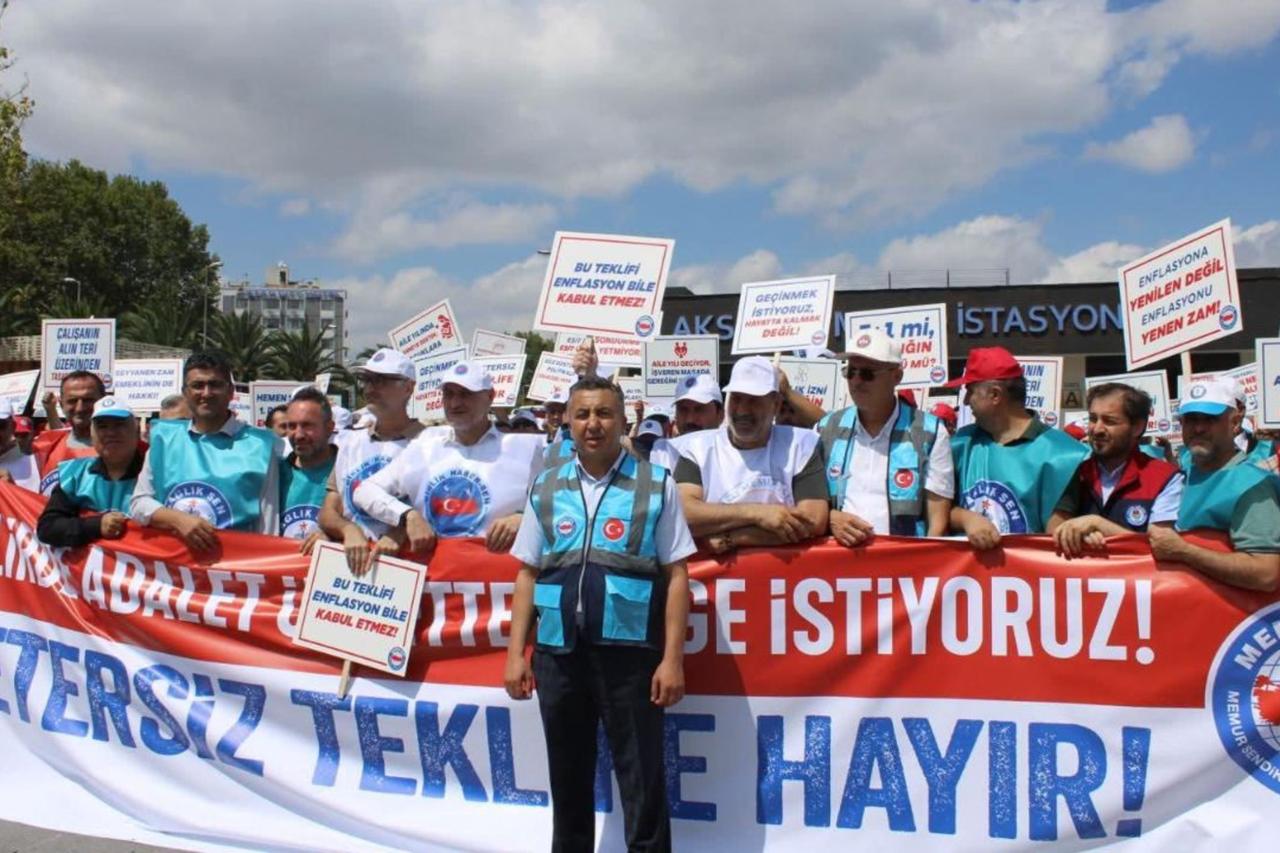
Public sector unions across Türkiye staged a one-day strike Monday to protest the government’s wage offer for 2026-27, which unions say is inadequate amid soaring living costs.
The action disrupted transportation and public services nationwide.
The government’s first proposal, unveiled on Aug. 12, offered a 10% raise for the first half of 2026 and 6% for the second. For 2027, the offer included two 4% raises. A second proposal on Aug. 15 added a ₺1,000 ($24.45) increase to base salaries, but unions dismissed it as insufficient.
Memur-Sen, the country’s largest public servants’ confederation, said the offer “ignores the reality of inflation.” Confederation chair Ali Yalcin declared, “We see nothing to negotiate. The government directs us to the streets.”

Seven confederations, including KESK, joined the strike, holding rallies in all 81 provinces. In Ankara, demonstrators gathered outside the Treasury and Finance Ministry as well as the Labor and Social Security Ministry.
The protest also affected daily life. The commuter rail system IZBAN, in Izmir, announced that all services were canceled for Aug. 18, citing the nationwide strike.
“Due to the one-day work stoppage organized by public employees across the country, we regret to inform you that all IZBAN services are suspended throughout the day,” the operator said on the social media platform X.
KESK Co-Chair Ahmet Karagoz stated: "As seven confederations, we will carry out a one-day warning strike on August 18 in all 81 provinces where we are organized. If our demands are not met, we will escalate this struggle to a general strike and full resistance."
Saglik-Sen leader Mahmut Faruk Dogan issued a press statement in front of the Ministry of Labor and Social Security. Dogan mentioned that the Public Employer Delegation proposed a 10% plus 6% raise for 2026 and a 4% plus 4% raise for 2027, and that on Sunday a ₺1,000 increase was suggested for the base salary.
Dogan criticized the offer as insufficient for health care and social service workers, as well as all public employees. He highlighted that many professions, from doctors and nurses to pharmacists and teachers, are struggling to make ends meet.
Dogan called on the Public Employer Delegation and the Ministry to submit proposals that reflect market conditions and inflation: "After the one-lira increase in the base salary, we tried to illustrate purchasing power by shopping for a few basic groceries. The total came to ₺1,065. How long would this last for a family of four? I present this to the Public Employer Delegation. This does not even cover milk, school supplies, education costs, or transportation. It doesn’t even reach the kitchen stove."
He requested a revision of the proposal and announced that protests will continue, with a rally scheduled for Monday at Tandogan Square.
Türkiye Kamu-Sen President Onder Kahveci said: "Salaries should be determined based on the reality of markets, stores, and rents, not imaginary estimates. We need numbers that reflect our hard work, not desk calculations. This struggle is not just for civil servants; it’s a fight for the entire nation. We are here, determined to claim our rights ..."
Members of Türkiye Kamu-Sen gathered in front of the Ministry of Treasury and Finance to protest the wage offer given to civil servants and retirees in the eighth collective bargaining period. The union members arrived with whistles, chanting slogans such as: "We are civil servants, we are right, we will win" and "Our love is for Türkiye, our fight is for bread."
They performed traditional dances to the song “Delalim” and accompanied it with Turkish flags.
Kahveci emphasized that the government’s proposal does not meet the needs of civil servants or retirees:
"This offer neither provides a solution for the tables of civil servants and retirees nor heals their wounds. It disregards the labor of millions. That’s why we rejected it, and today we are loudly rejecting it in the streets."
He added that rising living costs make current salary increases insufficient: "Expenses are rising exponentially while salaries barely increase. Civil servant and retiree wages are insufficient to live on today. If additional payments are not reflected in pensions, this hardship will deepen further over the next two years."
Kahveci underlined that Türkiye Kamu-Sen’s demands include real wage increases, a share in national wealth, compensation for past losses, and concrete improvements in social rights: "The offer we received is detached from reality, calculated at a desk. We demand wage justice in the public sector... Every right we win will be a shared victory. While some are given large amounts with a scoop, civil servants shouldn’t get crumbs."
Following the press statement, union leaders from Türkiye Kamu-Sen left their protest banners at the Ministry’s gates.
Inflation officially stood at 33.5% in July, though independent researchers estimate it closer to 65%. According to Turk-Is, the poverty line for a family of four in Ankara reached ₺86,036 ($2,103.84) per month in July, with the hunger line at ₺26,413.
Memur-Sen had previously demanded wage hikes of 88% for 2026 and 46% for 2027, warning that without them, public employees will remain “crushed under inflation.”
Amid the unrest, the state postal service, Post and Telegraph Organization (PTT), issued a written directive warning its staff not to join the strike. In a circular signed by General Manager Dr. Hakan Gulten and Deputy General Manager Fatih Tezcan, employees were reminded that “public officials have no legal right to abandon their duties or stop working.”
The notice instructed all staff to remain at their posts on Aug. 18 and warned that disciplinary action would be taken against those who participated in the walkout. Managers were also ordered to closely monitor attendance and report any employees involved in the strike.